Ectopic pregnancy is a potentially life-threatening condition in which a fertilized egg implants and grows outside the uterus. Normally, after fertilization, the fertilized egg travels down the fallopian tube and implants itself into the lining of the uterus, where it can grow and develop into a fetus.

What is Ectopic Pregnancy?
Ectopic pregnancy is a medical condition in which a fertilized egg implants and starts to develop outside the uterus, usually in the fallopian tube. The term “ectopic” means “out of place.” In a normal pregnancy, after fertilization occurs, the fertilized egg travels down the fallopian tube to reach the uterus, where it implants into the uterine lining and grows into a fetus. However, in an ectopic pregnancy, the fertilized egg does not make it to the uterus and instead implants in another location.
The majority of ectopic pregnancies occur in the fallopian tubes, which are not designed to support the growth of a fetus. In rare cases, ectopic pregnancies can also occur in other locations outside the uterus, such as the ovary, abdomen, or cervix.
Causes of Ectopic Pregnancy
Some of the common causes and risk factors associated with ectopic pregnancy include.
- Previous Pelvic Inflammatory Disease (PID): PID is an infection of the female reproductive organs, often caused by sexually transmitted infections like chlamydia or gonorrhea. Untreated or inadequately treated PID can lead to inflammation and scarring in the fallopian tubes, increasing the risk of ectopic pregnancy.
- Previous Ectopic Pregnancy: Women who have had an ectopic pregnancy in the past are at a higher risk of experiencing another one in subsequent pregnancies.
- Previous Pelvic or Abdominal Surgery: Surgeries involving the pelvic region, such as surgeries to treat conditions like endometriosis or fibroids, can cause adhesions and scarring, which may hinder the normal movement of the fertilized egg through the fallopian tubes.
- Abnormalities in the Fallopian Tubes: Structural issues in the fallopian tubes can prevent the fertilized egg from passing through to the uterus, leading to an ectopic pregnancy.
- Use of Assisted Reproductive Technologies (ART): Fertility treatments such as in vitro fertilization (IVF) can increase the likelihood of multiple pregnancies and, consequently, the risk of an ectopic pregnancy.
- Smoking: Smoking has been associated with an increased risk of ectopic pregnancy.
- Age: The risk of ectopic pregnancy is higher in older women.
- Contraceptive Methods: While rare, contraceptive methods such as intrauterine devices (IUDs) and tubal ligation (permanent sterilization) can fail and increase the risk of ectopic pregnancy.
- Sexually Transmitted Infections (STIs): Certain STIs can lead to inflammation and scarring in the reproductive organs, making ectopic pregnancy more likely.
- Fertility Issues: Women who have difficulty conceiving naturally may have an increased risk of ectopic pregnancy.
Symptoms and Signs:
the following symptoms may become noticeable.
- Abdominal or Pelvic Pain: One of the most common symptoms of an ectopic pregnancy is pain, which is often felt on one side of the lower abdomen or pelvic region. The pain may be sharp, stabbing, or cramp-like in nature and can range from mild to severe.
- Vaginal Bleeding: Light vaginal bleeding or spotting might occur, which can be mistaken for a light period. This bleeding may be different from a typical menstrual period and can be pinkish or brownish in color.
- Shoulder Pain: In some cases, the ectopic pregnancy can cause internal bleeding, which may irritate the diaphragm and cause referred pain in the shoulder area.
- Weakness, Dizziness, or Fainting: If the ectopic pregnancy leads to significant internal bleeding or rupture, it can cause symptoms of shock, such as weakness, dizziness, fainting, and a rapid heartbeat.
- Gastrointestinal Symptoms: Some women may experience symptoms resembling gastrointestinal issues, such as diarrhea or nausea.
- Missed Menstrual Period: Although some women may experience vaginal bleeding, others might not have any bleeding at all, leading to a missed menstrual period. However, a missed period can also be a symptom of a normal pregnancy or other conditions, so it is essential to consider other symptoms as well.
Prevention of Ectopic Pregnancy:
Here are some preventive measures.
- Safe Sex and STI Prevention: Practicing safe sex and using barrier methods like condoms can help reduce the risk of sexually transmitted infections (STIs) that can lead to pelvic inflammatory disease (PID) and increase the chances of an ectopic pregnancy.
- Early Detection and Treatment of STIs: If you suspect you have an STI or have had unprotected sex with a partner whose STI status is unknown, seek testing and treatment promptly to prevent complications like PID.
- Regular Gynecological Check-ups: Regular visits to a gynecologist are crucial for early detection of any reproductive health issues, including infections and structural abnormalities that may increase the risk of ectopic pregnancy.
- Contraception: Proper and consistent use of contraception can significantly reduce the risk of unwanted pregnancies, including ectopic pregnancies. There are several contraceptive options available, such as birth control pills, intrauterine devices (IUDs), condoms, and hormonal implants. Talk to a healthcare provider to find the most suitable method for your needs and lifestyle.
- Prioritize Early Prenatal Care: If you suspect you might be pregnant, seek prenatal care as soon as possible. Early prenatal visits can help detect and manage ectopic pregnancies or other potential complications early on.
- Manage Ectopic Pregnancy Risk Factors: If you have any known risk factors for ectopic pregnancy, such as a history of PID or previous ectopic pregnancy, discuss your concerns with a healthcare provider. Regular monitoring and early intervention can be essential in managing these risks effectively.
- Cessation of Smoking: Smoking has been associated with an increased risk of ectopic pregnancy. Quitting smoking can not only reduce this risk but also improve overall health and fertility.
- Limit the Use of Assisted Reproductive Technologies (ART): While ART can help couples conceive, it is associated with a slightly higher risk of ectopic pregnancy due to the increased likelihood of multiple pregnancies. Discuss the potential risks and benefits of ART with a fertility specialist.
- Know the Symptoms: Familiarize yourself with the symptoms of ectopic pregnancy, such as abdominal or pelvic pain, vaginal bleeding, and shoulder pain. Being aware of these signs can prompt you to seek medical attention promptly if they occur.
Diagnosing Ectopic Pregnancy:
Here are the common methods used to diagnose ectopic pregnancies.
- History and Physical Examination: The healthcare provider will start by taking a detailed medical history, including any previous pregnancies, surgeries, or gynecological issues. They will then conduct a physical examination, including a pelvic exam, to check for any signs of tenderness, swelling, or abnormalities.
- Blood Tests: A blood test will be done to measure the levels of the hormone human chorionic gonadotropin (hCG). In a normal pregnancy, hCG levels typically double every 48-72 hours during the early stages. In an ectopic pregnancy, the hCG levels may rise more slowly than expected or may not rise appropriately.
- Transvaginal Ultrasound: This is a critical imaging test used to visualize the reproductive organs. A transvaginal ultrasound can help identify the location of the pregnancy and whether it is developing inside the uterus or elsewhere. It can also help detect other signs of ectopic pregnancy, such as fluid in the pelvis or fallopian tubes.
- Serial hCG Monitoring: If the initial hCG levels are inconclusive or if the location of the pregnancy is not clear from the ultrasound, serial hCG monitoring may be done. This involves multiple blood tests over a few days to track how the hCG levels are changing. A significant lack of rise in hCG levels over time may indicate an ectopic pregnancy.
- Culdocentesis (Rarely Used): In some cases, a procedure called culdocentesis may be performed. This involves inserting a needle into the space behind the vagina to check for the presence of blood. If there is significant bleeding due to a ruptured ectopic pregnancy, blood may be detected in this area.
Complications and Risks:
Some of the complications and risks associated with ectopic pregnancies include.
- Ruptured Ectopic Pregnancy: As the embryo grows, the fallopian tube or the surrounding tissue may not be able to accommodate its growth, leading to the rupture of the fallopian tube or other affected organs. A ruptured ectopic pregnancy can cause severe internal bleeding, which is a medical emergency requiring immediate surgery.
- Internal Bleeding: Even if the ectopic pregnancy does not rupture, it can cause bleeding into the abdominal cavity or other surrounding structures. Significant internal bleeding can lead to hemorrhagic shock, a life-threatening condition that requires immediate medical attention.
- Emergency Surgery: If an ectopic pregnancy is not diagnosed and treated promptly, emergency surgery may be necessary to remove the ectopic pregnancy and stop the bleeding.
- Infertility: An ectopic pregnancy can cause damage to the fallopian tube or other reproductive organs. In some cases, this damage may affect fertility and make it more challenging for a woman to conceive in the future.
- Recurrence: Women who have had an ectopic pregnancy in the past are at a higher risk of experiencing another ectopic pregnancy in subsequent pregnancies.
- Emotional and Psychological Impact: Dealing with an ectopic pregnancy can be emotionally challenging for the woman and her partner. The loss of a pregnancy and the potential impact on future fertility can cause significant emotional distress.
- Ectopic Pregnancy in Rare Locations: In very rare cases, ectopic pregnancies can occur in unusual locations, such as the ovary or abdomen. These instances can be even more challenging to diagnose and manage.
- Delayed Diagnosis: Ectopic pregnancies can be challenging to diagnose, especially in the early stages when symptoms may be vague or similar to other conditions. Delayed diagnosis can lead to more severe complications and risks.
Treatment Options:
The two primary treatment options for ectopic pregnancy are.
Medical Management:
- Methotrexate: This is a medication that can stop the growth of the ectopic pregnancy. It works by inhibiting cell division, which prevents the developing embryo from growing further. Methotrexate is typically administered as an injection. After treatment, the woman’s hCG levels are monitored regularly to ensure that the ectopic pregnancy resolves successfully. This treatment is usually an option for women with early ectopic pregnancies, stable conditions, and no signs of rupture or severe bleeding.
Surgical Interventions:
- Laparoscopic Surgery: Also known as minimally invasive or keyhole surgery, laparoscopy involves making small incisions in the abdomen to insert a thin, flexible tube with a camera (laparoscope) and surgical instruments. The surgeon uses the laparoscope to view the pelvic organs and remove the ectopic pregnancy. This approach is preferred when the ectopic pregnancy is detected early and the fallopian tube is not severely damaged.
- Salpingectomy: In cases where the fallopian tube is significantly damaged or has already ruptured, the surgeon may need to remove the affected tube entirely. This procedure is called a salpingectomy. It is necessary to prevent severe bleeding and future ectopic pregnancies in the same tube.
- Salpingostomy: In some situations, if the ectopic pregnancy has not caused severe damage to the fallopian tube, the surgeon may opt for a salpingostomy. During this procedure, a small incision is made in the fallopian tube, and the ectopic pregnancy is removed. The surgeon then sutures the tube to promote healing. Salpingostomy aims to preserve the fallopian tube and improve the woman’s chances of future fertility.
Recovery and Follow-up:
Here are some general guidelines for recovery and follow-up after an ectopic pregnancy.
- Hospital Stay: If the ectopic pregnancy was diagnosed early and treated with methotrexate or laparoscopic surgery, the woman may be discharged from the hospital on the same day or within a day or two after the procedure. However, if the ectopic pregnancy has ruptured or required more extensive surgery, a longer hospital stay may be necessary.
- Physical Rest: It is essential to get plenty of rest during the initial recovery period. The body needs time to heal, especially if surgery was involved.
- Pain Management: Pain and discomfort are common after surgery or medical treatment. Over-the-counter pain medications or prescription pain relievers prescribed by the healthcare provider can help manage pain during the recovery period.
- Follow-up Appointments: After treatment, the woman will need to attend follow-up appointments as advised by the healthcare provider. These appointments are essential to monitor recovery progress and check for any signs of complications.
- Monitoring hCG Levels: For women treated with methotrexate or in cases where the hCG levels were not immediately reduced after surgery, monitoring hCG levels will be necessary. The hCG levels will be regularly checked until they return to non-pregnant levels, indicating that the ectopic pregnancy has resolved.
- Emotional Support: Dealing with an ectopic pregnancy and its aftermath can be emotionally challenging. Emotional support from healthcare providers, friends, family, or support groups can be beneficial during this time.
- Future Fertility: Depending on the extent of damage to the fallopian tubes and other reproductive organs, the healthcare provider may discuss future fertility options with the woman. For some women, it may still be possible to conceive naturally after an ectopic pregnancy, while others may require assisted reproductive technologies (ART) such as in vitro fertilization (IVF).
- Contraception: After an ectopic pregnancy, the healthcare provider will discuss contraception options with the woman to prevent unintended pregnancies while her body is recovering and to reduce the risk of future ectopic pregnancies.
- Mental and Physical Well-being: It’s essential to take care of both mental and physical well-being during the recovery period. Engaging in activities that promote relaxation, such as meditation or gentle exercises, can be helpful.
FAQs
Can an ectopic pregnancy be viable?
No, unfortunately, an ectopic pregnancy is not viable. The fertilized egg implants and grows outside the uterus, usually in the fallopian tube, where it cannot develop into a healthy baby. Continuing the pregnancy in such a location can be life-threatening for the woman due to the risk of rupture and internal bleeding.
Is there any way to save an ectopic pregnancy?
As of my knowledge cutoff in September 2021, there is currently no way to save an ectopic pregnancy. The treatment goal is to remove the ectopic pregnancy to prevent further complications and protect the woman’s health and fertility.
What are the chances of having a second ectopic pregnancy?
The risk of having a second ectopic pregnancy increases after experiencing one in the past. The likelihood of a subsequent ectopic pregnancy varies depending on individual factors and the underlying causes of the initial ectopic pregnancy. The risk may be higher in women with certain risk factors, such as previous pelvic inflammatory disease (PID) or previous ectopic pregnancies.
Can fertility be affected after an ectopic pregnancy?
Fertility can be affected after an ectopic pregnancy, especially if there was damage to the fallopian tubes or other reproductive organs. The extent of the impact on fertility depends on factors such as the extent of damage, the type of treatment received, and individual factors. Some women may still be able to conceive naturally after an ectopic pregnancy, while others may require assisted reproductive technologies (ART) to achieve pregnancy.
Are there any warning signs of an ectopic pregnancy?
Yes, there are warning signs of an ectopic pregnancy. These may include abdominal or pelvic pain (usually on one side), vaginal bleeding or spotting, shoulder pain, weakness, dizziness, or fainting. It’s essential to seek immediate medical attention if you experience any of these symptoms, especially if you have a positive pregnancy test or suspect you might be pregnant.
Can an ectopic pregnancy be detected early?
Detecting an ectopic pregnancy early can be challenging because the symptoms can be similar to other conditions. However, with regular gynecological check-ups and early prenatal care, an ectopic pregnancy may be detected through blood tests to monitor hCG levels and transvaginal ultrasound imaging.
How is an ectopic pregnancy treated?
The treatment of an ectopic pregnancy depends on factors such as the size, location, and condition of the woman. Treatment options may include medical management with methotrexate to stop the growth of the ectopic pregnancy or surgical intervention to remove the ectopic pregnancy and preserve the affected fallopian tube if possible.
Conclusion:
In conclusion, ectopic pregnancy is a serious medical condition in which a fertilized egg implants and grows outside the uterus, commonly in the fallopian tube. Early detection and appropriate treatment are essential to prevent life-threatening complications, such as ruptured ectopic pregnancies and internal bleeding. Treatment options may include medication or surgical intervention to remove the ectopic pregnancy. Follow-up care and emotional support are crucial for the woman’s recovery and well-being. While an ectopic pregnancy cannot be viable, with timely medical attention and proper management, most women can recover and go on to have healthy pregnancies in the future if desired. It’s essential to seek medical attention promptly if any symptoms of ectopic pregnancy arise or if there are concerns about reproductive health.
Possible References Used





